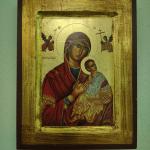The gospel of Matthew can be called the refugee gospel. Scholars think it is the product of the aftermath of the Jewish War with the destruction of the Temple in AD 70. It grew out of the early Christian community that formed from these refugees in Antioch. Matthew brings an understanding of forced displacement to the Gospel of Christ. The book does this in more than one way. It illustrates the beginning of the division of the Christians from the greater Jewish family.
The Refugee Messiah
Matthew is the only gospel that tells the story of the Holy Family seeking refuge in Egypt. Joseph is the leader of a refugee household. He takes the family from Bethlehem just before Herod is murders the infants in the town. Even though Egypt is under Roman control, the country is outside Herod’s domain. Jesus as a small child is a refugee. Egyptian Alexandria had a large Jewish population that traced its’ roots to the time of the prophet Jeremiah. Matthew does not say Joseph took his family there. But the theme of exile should not be missed. Thriving Jewish communities could be found in almost every major city of the Empire and outside of it. The lesson that one can serve God outside the historic land of Israel is important for Matthew’s exile community.
The Way
Matthew presents the community a new way of keeping Torah – the laws and customs of Moses given at Mt. Sinai. Jesus, in Matthew, is a new Moses who renews and fulfills the Torah. Jesus of Nazareth calls on his followers to demonstrate a “righteousness that exceeds that of the Pharisees and the Scribes.” Joseph is righteous and seeks refuge away from the Promised Land. John the Baptist gives his prophecy and baptizes in the border lands. Matthew also uses “the sign of Jonah” as a figure for one who was outside. Jonah was sent among the Assyrians to prophesy.
A mistake in interpreting Matthew is to think of Jesus offering a new law. Rather, Jesus reissues Torah for a way of keeping it in exile. The importance of being a refugee community is neglected by interpreters who think Jesus as Messiah was doing away with the ways of Moses. Matthew is providing the means for holding the exiled Christian community together. The disciples who are outside or exiled are following the Way.
The Refugee Separation
Two troubling teachings from Matthew indicate the pain of separation. Jesus provides himself an identity separate from his family. “Jesus replied, ‘Who is my mother and who are my brothers?’ And pointing to his disciples, he said, ‘Here are my mother and brothers! For whoever does the will of my Father in heaven is my brother and sister and mother.'” (12:48b-49) Were his mother and brothers not doing the will of his Father? What about the disciples whose families were not doing the will of the Father?
“Do not think that I have come to bring peace to the earth; I have not come to bring peace, but a sword…Whoever loves father or mother more than me is not worthy of me; and whoever loves son or daughter more than me is not worthy of me; and whoever does not take up the cross and follow me is not worthy of me.” (10:34-38) There is something chilling about those words. They have been abused by cult leaders and others seeking complete influence over the life of another person. What about when an ultimatum is given to the disciple from a close relation that is not a disciple? The fifth commandment, “Honor your father and mother..,” can also be used in an abusive way.
Matthew uses these texts to recognize a reality of refugee life. Toxic families are not new phenomena. Communities can become unbearable. The only option sometimes is to walk away (if not run). The resulting separation is part of taking the Cross.
The Compassionate Refugee Community
The Beatitudes in Matthew indicate the refugee community of disciples were in danger of letting hostility overcome it. Displaced people can easily decide to hate the ones who took away their homes. Seeking justice can turn to seeking revenge. Grace is hard to extend when people do not believe they have received it. Jesus in Matthew demands the separation from all unrighteousness so that the community can remain compassionate. Separating a destructive person from the church (only Matthew among the gospels uses that word) may be necessary if reconciliation is impossible (18:15-20). Failure to be compassionate carries the penalty of separation from the redeemed when the Son of Man comes (25:31-46).
Present day refugees need the same compassion from the people reading Matthew now. We have an idea from the gospel what being in that position is.












